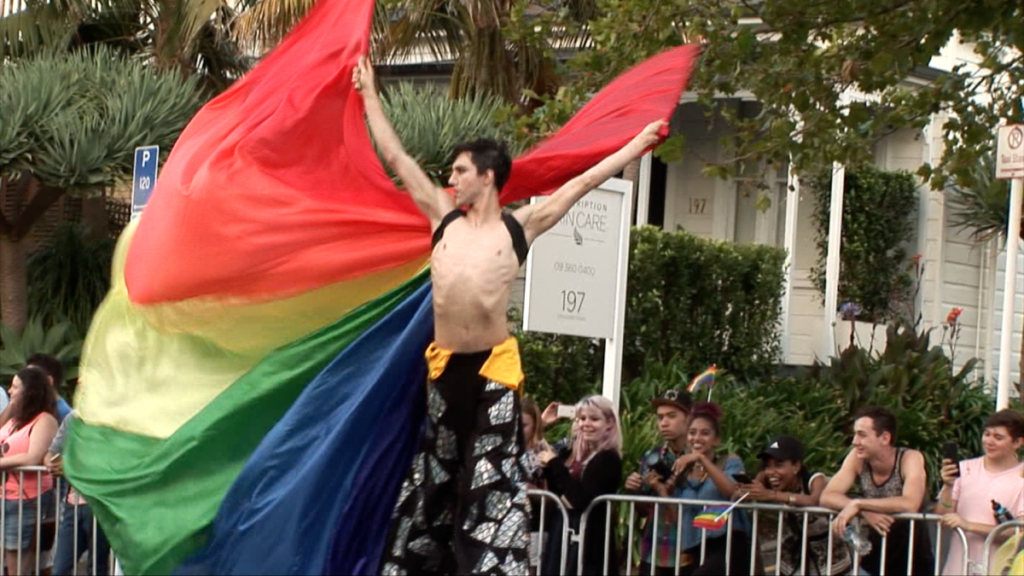The woman who has helmed Auckland Pride for the past two and a half years and steered it through the most tumultuous period of its existence, has left the organisation.
Chair Cissy Rock and board members Zakk d’Larte, Phylesha Brown-Acton, Robyn Vella, and Duncan Matthews stepped down from their roles at Auckland Pride’s Annual General Meeting.
Unlike some past meetings, this one was more business-like and without any acrimony. About 55 people turned up for the event which was preceded by a workshop on various pride issues.
There were a raft of motions passed involving representation of minorities and increasing the cultural competency of the Board, but two in particular stood out.
The membership decided to withdraw from Interpride, the global alliance of pride organisations; and they voted to end any discussions or engagement with the New Zealand Police Force.
In both cases this was related to what what was described as systemic issues within those organisations and their misalignment with the values espoused by Auckland Pride.
Another motion that was debated, but defeated, called on Auckland Pride to replace the current director with a tangata whenua-led collective to run future festivals.
Auckland Pride Finances
The Statement of Financial Position in the Annual Report showed income fell by 153% and expenditure by 166%, compared to the previous year. This resulted in a deficit of $17,860, compared to a surplus $8,264 in 2018. Accumulated funds dropped from $65,659 in 2018 to $47,718 in 2019.
These reductions occurred in what is described as “revenue from, or costs related to providing goods and services.” This was presumably due to the cancellation of the Pride Parade and other events in that financial year, but no explanation for the drop was given in the Treasurer’s Report.
The Statement of Cashflows reported an increase of $28,981 (416%) in donations and fundraising over 2018 of which $35,665 came from “koha from the public.”
Elections
With four board members retiring, five candidates stood for election. The successful candidates were: Robyn Vella, Kyle Habershon, Michale McCabe, and Piripi Mackie.
Under the new constitution, six board members are voted on by the membership, two others can be co-opted, and a ninth position is set aside for a representative chosen by takataapui.
At the end of the meeting, the outgoing members of the board were farewelled with a waiata and presented with flowers. Board member Michael Lett paid an emotional tribute to chair Cissy Rock.
Observations
In many ways, this AGM illustrated that changes begun in 2018 with the banning of Police from the Pride Parade, have now been firmly bedded in, with the membership mostly supporting the direction set by the board.
It should be noted that, once again, the people who have been staunchly opposed to the Board decisions over the past two years, were mostly absent.
There were moments of awkwardness. Errors in the printed financial tables caused a delay in their acceptance. Given that financial reporting is a legal requirement and probably one of the most important parts of an AGM it was a sloppy and embarrassing mistake.
The motion attempting to change the existing Director role to a tangata whenua-led collective, was uncomfortable to watch. Whatever the intention behind it, it appeared ill-thought out and was, I imagine, extremely unpleasant for the existing Director.
The discussion and vote that resulted from this motion did however bring about one of the most interesting and exciting displays of the democratic process I have ever witnessed. Rather than follow conventional procedure, the Chair chose to have everyone present stand up and discuss the motion for some time. It was a refreshing approach.
What is clear to me is that a large chunk of the membership represented at the meeting have a strong determination to root out inequality.
As mentioned above, Board members must now be trained in cultural competencies and the membership is demanding that the organisation engage with ethnic minorities within the wider Rainbow communities and proactively work towards their inclusion and empowerment. Furthermore, it seems that some members are strongly pushing the ideal that any entity Auckland Pride deals with, should come under scrutiny to see if its policies and practices match those of Pride.
These are very admirable goals and ones that I am sure most reasonable people would support. The challenge of course with this ambition is how to handle the nuances of applying the ideals to real situations that are often complex and result from error rather than malice. There is also an added challenge that any organisation or individual that puts forward strong ideals and values must also adhere to them, and have robust processes to ensure that they do.
There are also other competencies that Auckland Pride needs to ensure are also maintained, particularly around governance and effective, honest and open communication. There have been lapses in these areas in the past.
As I have written many times, ‘Pride’ is much bigger than any pride organisation or individual. Auckland Pride may be a registered charity and have a responsibility to its membership and constitution, but it also has a very real and moral responsibility to the communities it is embedded in, and from which it was created.
Pride is intended to make us feel good about ourselves and foster a sense of community, but it is clear that the Auckland LGBTQI communities are still divided. Every single one of us has a stake in Pride, and all of us come from some kind of minority and are affected by intersectionality.
The question that comes up for me around all of this is – can that breach be healed and can Auckland Pride reconnect with many in the community who now feel abandoned by the organisation?
It is possible, but of course there needs to be a willingness and desire on all sides for that to happen.
